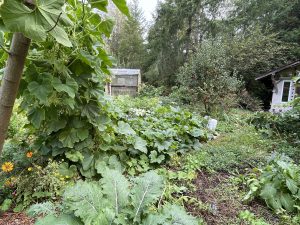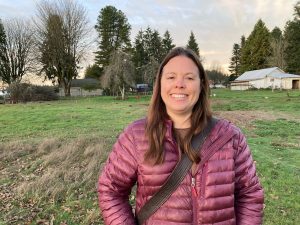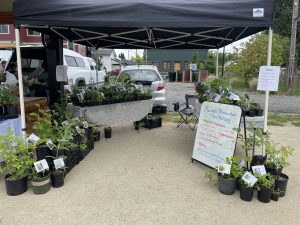What can we do to enhance the resilience of our community and the long-term productivity of our land?

Permaculture is a system that answers that question with general principles that are adapted to each bioregion. Permaculture has been practiced under that name since the 1970’s, and for thousands of years before by traditional societies. However, it is radically different from gardening and farming methods used by most Americans today. Most new permaculture gardeners benefit from instruction and coaching.
A Local Advocate and Teacher

Marisha Auerbach is a passionate advocate for permaculture who has taught workshops and courses for over twenty-five years. Marisha graduated from The Evergreen State College in 1998 with a B.A. in organic farming, and she has certification in permaculture. She has worked with Wild Thyme Farm and Fertile Ground for over twenty-five years.
Marisha has just purchased a farm near Little Rock. Her vision is for the farm to anchor her nursery business and to be a place to bring people together to learn and practice permaculture, share their experiences, and learn about our local biodiversity. The farm is at the midway point of our Cascadia Bioregion. The farm is the perfect location for a bioregional experimental station to explore adaptation to climatic fluctuations through different growing methods and wild and domestic varieties of edible plants.
Opportunities to Learn and Practice
Marisha offers a variety of ways to begin using permaculture principles in a home garden. The workshop series “Grow Your Own Produce”, now in its eleventh season is a 10-class monthly series taught by zoom. Each class features seasonally relevant information about planning, growing, maintaining, and harvesting food from the student’s own vegetable garden. People can sign up for the full 10-class series, a 5-class consecutive package, or individual classes.
The next course starts in February! To register, click on https://www.fertileground.org/grow-your-own-produce-worksho
Buy Plants Adapted to Our Bioregion

Even if a gardener is not able to use all strategies of the permaculture system, gardens have a much better chance of thriving if the plants are adapted to our bioregion. Marisha has a nursery for plants that are grown from local seeds and are proven winners in our climate. She sells the plants individually during the nursery season.
Another way to order nursery plants is through Marisha’s Community Supported Agriculture (CSA) program. People can join the farm as subscribers ordering “packages” of plants for specific purposes, such as pollinators, perennial veggies, culinary herbs, edible flowers, guild plants under fruit trees, or native plants.
People can pick up their plant orders in either Portland or at the nursery/farm in Olympia.
Bare root shrubs and trees will be available in March. Marisha will sell potted nursery stock beginning in April.
To find out more, go to https://www.permaculturerising.com/marisha-s-permaculture-plant-nurser
The New Version of Fertile Ground
Many WIP readers may remember “The Commons at Fertile Ground”, an urban garden and nonprofit community center started by Karen Nelson and Gail O’Sullivan in 1998 at the corner of 911 Adams St. SE in Olympia. It was more than a beautiful and productive garden. The focus was always on creating community connections through learning about and celebrating (and sharing) the vegetables and herbs.
Little remains of The Commons’ abundant garden except edible landscaping (berry bushes and fruit trees) in Rebecca Howard Park. But the mission of The Commons lives on in the mission of the nonprofit Fertile Ground, focused on teaching permaculture and biodiversity in the Cascadia Bioregion. For example, Fertile Ground’s website states: “We offer workshops, seasonal celebrations, work parties, opportunities for reflection, community-building activities, and times to play together; highlighting the intrinsic benefit of coming home to the land as a foundation for stability in our bioregion.”
Fertile Ground has expanded its mission beyond urban sustainability to focus on sustainability for the entire bioregion. To learn more, go to https://www.fertileground.org/
Permaculture versus Other Sustainable Food Cultivation
I asked Marisha about the difference between permaculture and other kinds of organic farming and gardening. She said the word “permaculture” is composed of the words “permanent” and “culture.”
Permaculture’s emphasis is on creating permanent systems to cultivate food with minimal inputs from off-site and with no damage to soils or ecosystems. But permaculture looks at all aspects of human life.
For Marisha, “permaculture is a design system that looks at the intrinsic qualities of our place and how this impacts our lifestyle choices. With this information, we can develop designs for homes, businesses, schools, and community spaces that invest in local resources, stewardship of our native areas, and reduce waste and pollution.”
If you are intrigued, here is a webpage that provides an overview on permaculture: https://www.corvallisadvocate.com/2016/permaculture-on-the-rise-a-philosophy-in-action/
You can also learn more about permaculture at Marisha’s website, Permaculture Rising: https://www.permaculturerising.com
Be First to Comment